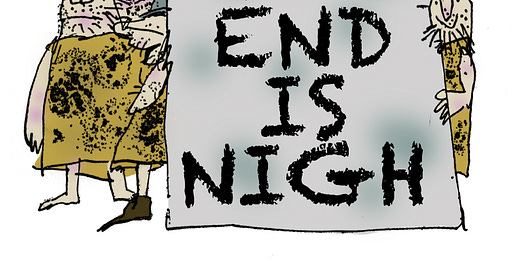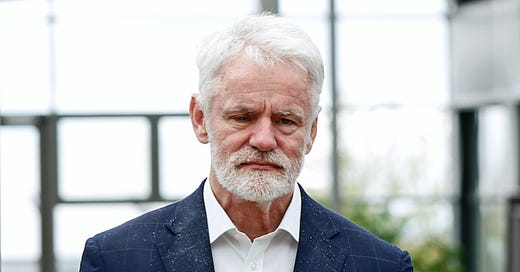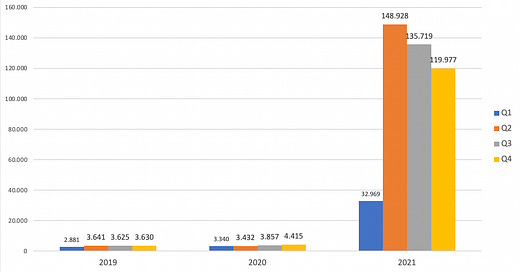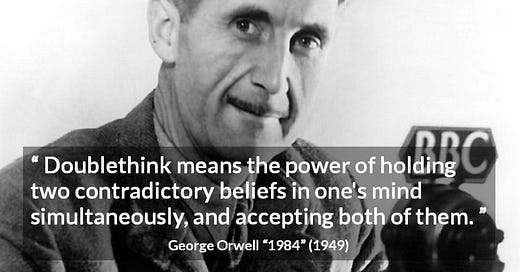

Discover more from From Symptoms to Causes
“Evil comes from a failure to think. It defies thought for as soon as thought tries to engage itself with evil and examine the premises and principles from which it originates, it is frustrated because it finds nothing there. That is the banality of evil.”
Hannah Arendt: Eichmann in Jerusalem
The other day, I had a chat with one of those who still believe all the panicked Covid reaction was justified. He asked me about conspiracies and „lizard people“, if I believed the mortality figures from around the world were faked (which I don’t), and whether it wasn‘t time that I and other sceptics relaxed with our „doomsday predictions“, referring to worries about free expression and personal freedom.
Being called a conspiracy theorist is nothing new to me, and I‘ve been accused of believing in the good old lizard people numerous times. The question about the mortality data had an attachment, an OWD chart comparing Covid mortality in Australia and New Zealand on one hand, and in Sweden and the US on the other (during a convenient period of course); the „good and the bad“, quite clearly. I‘m sure it was intended to get me to reflect on how brilliantly the two first countries had dealt with the „deadly virus“. I didn‘t notice this chart however, until after I asked the guy if he was referring to the Economist claim of how mortality was triple the official figures, the only widely publicised claim of this kind I could recall. I haven‘t yet received an answer to that question. It was the doomsday question however which I found most interesting. Especially when taking into account the „good/bad“ OWD chart purported to show how locking people up for years on end was the appropriate reaction to a respiratory virus. For what was it that I was really dealing with that Saturday morning, but exactly this; doomsday mentality?
Doomsday mentality is nothing new. As journalist Toby Young explained at the inaugural meeting of the Icelandic Free Speech Society in January, it is based on our propensity to let predictions of potentially catastrophic but extremely unlikely events drive us mad with fear. The Covid-19 reaction was a consequence of doomsday mentality, a mentality that seems to have taken quite a strong hold in the population in recent years.
It is my conclusion that the main reason for this is the erosion of critical thinking. This is why I‘ve now started a new Substack blog, The Edge of Reason, aimed at helping people sharpen their critical thinking skills. This is a small step, but hopefully in the right direction.
When we are constantly bombarded with doomsday predictions; relatively mild viral epidemics are magnified into killer plagues, or we are told the world will end in in eight years from now, it is easy to get carried away and fall prey to the propaganda. This happened when the fear of the coronavirus took over. It is now three years since schools were closed, gatherings banned and people forced to wear masks and stay in their homes; all measures without benefits, but causing untold harm. All this happened because of fear, driven by massive propaganda.
But a small minority of people did not let the propaganda scare them out of their wits. Not satisfied with newspaper headlines and TV scaremongering, they sought out information themselves, scrutinised facts and arguments, asked critical questions about the media narrative when suspicious discrepancies crept up, dived into datasets and scientific journals. In other words, they applied critical thinking.
Now, three years later, when the dust is finally settling after the fear pandemic, the consequences of it can be clearly seen. We see them in the inflation and crippling debt of countries that shut down their economies in a misguided attempt at halting the spread of a highly contagious respiratory virus. We see them in the irreversible damage to our children, isolated, locked out of school. We see them in the effects on public health, in the starvation and deaths of millions, and perhaps most importantly in the mounting distrust of government and public health officials who lied and knowingly inflicted harm by imposing useless and damaging measures, and who deliberately silenced all criticism of their conduct. It is in this light that we must look at Hannah Arendt's words on the banality of evil.
When the the skeptics first heard about plague with a 3-5% mortality rate and saw videos of people dropping dead in Wuhan as soon as they got infected, their first reaction was not to lock themselves up and hide under the bed, but to ask questions:
Is it credible that people drop dead the instant they contract a respiratory disease?
What effect will it have on the spread of the virus if the mortality rate is 3-5%?
Is the mortality rate really that high, or does it only appear to be so because of how few people have been diagnosed?
Does any research confirm this mortality rate?
What was the experience on the Diamond Princess cruise ship and the USS Theodore Roosevelt?
Which age groups are really at risk from the virus?
Are claims about the benefits of face masks supported by research?
It was by asking questions such as these that the skeptics realised very quickly how the claims of the high death rate, and the scary videos distributed by the mainstream media, were nothing but misinformation, how people in their 80s were at more than 400 times higher risk than those in their 20s, how there was no evidence for claims that mask usage restricted spread. This was soon confirmed by data and studies. But it was forbidden to mention it.
The conclusion of those who applied critical thinking was that neither the government nor the media could be trusted. Unfortunately, this has not changed, but at the same time more and more people are realising how serious it is. We know where the misinformation and disinformation comes from; it comes from the exact same sources who claim to fight it.
During the past three years, the sceptics have been branded conspirary theorists misinformation agents, accused of being against science, of having a sinister agenda. They‘ve been called doomsday prophets, while in fact what they‘ve done is to apply their critical thinking skills to counter the fearmongering of the actual doomsayers. The same goes for those who ask questions about the climate change narrative, those who frown sceptically when told the apocalypse is only a few years away.
The Covid narrative is now crumbling. The fearmongerers are increasingly becoming an object of ridicule. Their panic was unfounded and the number of those who understand this grows day by day. It is now time we start calling the doomsayers by their right name, start taking the snake-oil salesmen for what they really are. For this is all they are, doomsayers and snake oil salesmen.
We must take them for what they are, we may ridicule them, and we should, but that does not mean we can let down our guard. For doomsayers are dangerous people. Whatever their own intentions may be, they pave the way for power-hungry psychopaths, whom we can always find lurking in dark corners, waiting for an opportunity to take advantage of our fear and grab the reins. The Covid-scare was not the first pandemic of fear, and it will certainly not be the last one. But the catastrophe it brought will most probably turn out to be the worst ever. If we don‘t react now, the next one will be even more ruinous for sure.
The only weapon we have against the doomsayers and the snake-oil salesmen is critical thinking. We must train ourselves in scrutinising texts, seek out true information, apply rigorous reasoning. And it is not enough that a tiny minority master those skills. We must be numerous enough, so that the next time around we can stop the doomsayers in their tracks. Ensuring this is the most important task ahead of us.
















Common sense is either identical to or hand-in-hand with critical thinking. Both is short supply, as the past 3 years have proven.
I’m a glass half empty gal, as a survival mechanism for issues great & small: if I expect the worst, I can mentally prepare for it, I will not be surprised by it. If I expect the worst & it doesn’t happen, that’s a pleasant surprise, cause for celebration or at least relief. Win-win!
Long ago I heard the term "Conspiracy Theorist" was coined by the CIA. As I see it, a Conspiracy Theorist would be a profession. When what we are really observing are theories put forward where there is some evidence but not yet provable. That lack of proof may be because the author has not found enough supporting information or that elements of government, corporations, or snake oil salespeople are obfuscating the real data. Was Pythagoras the original conspiracy theorist with his Theorem? Or, was he putting forth a theory he could not yet prove?
In my distant past as a college student I was required to take a class in deductive logic. We learned all about logical fallacies and how to recognize them. But, I realized some of the students were studying them so that they could use them to convince the unwary. I believe many of those people went on to spectacular careers in politics, business, and advertising.